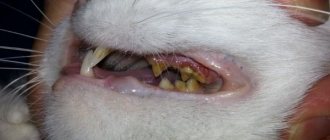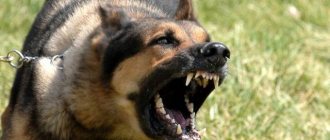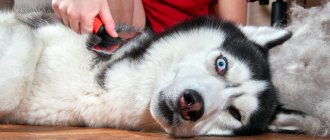Why is the dog shaking his ears?
The pet can not only shake its head, but also constantly scratch its ears
. If the dog shakes its head, then you must first determine the cause of this phenomenon. This behavior can be a consequence not only of various diseases, but also be caused by parasites or injuries.
Ear mite
Otodectosis can be a common reason why a dog scratches its ears and shakes its head. It is caused by a microscopic parasite called the ear mite. The auricle is an ideal place for its reproduction, as it feeds on blood, lymph, epidermis and earwax.
This disease can be identified by the characteristic odor and discharge from the ears. Changes also occur in the dog's behavior. She may shake her head and whine in pain.
Attention! Over time, the dog scratches its ears until it bleeds, in which case an infection can get through open wounds and aggravate the disease.
Ear mites are the most common cause of head shaking.
Ear vasculitis
Another reason for a dog’s uncharacteristic behavior can be vasculitis. These are autoimmune diseases - inflammation of the vessels of the auricle. They may be a consequence of:
- insect or tick bites;
- food allergies;
- improper treatment;
- frostbite.
As a result of constant discomfort, the animal begins to shake its head and scratch itself. This leads to bleeding of the skin and penetration of bacteria, which only worsens the disease.
Ear otitis
Ear inflammation, or otitis media, is quite common. Some breeds are predisposed to this disease. The risk group includes the French bulldog, terriers, German shepherd, Labrador, and dachshund. The first signs of otitis media are purulent discharge and an unpleasant odor from the ears. Based on localization, otitis is divided into:
- outer;
- average;
- interior.
Ear inflammation can be caused by:
- Unbalanced diet. Sweet and smoked foods in a dog’s diet can trigger otitis media.
- Bacteria or fungi. A healthy dog always has opportunistic microflora in its ear. But when immunity is impaired, favorable conditions arise for its reproduction, which is the beginning of the pathological process.
- Various tumors and papillomas lead to narrowing of the ear canal, which can lead not only to hearing loss, but also to brain diseases.
Attention! It is important to understand that for otitis media, which have a different nature of occurrence, treatment will vary dramatically.
If, as a result of an examination by a veterinarian, parasitic otitis media is detected, then treatment should be made for ecto- and endoparasites. Medicines for this disease are usually dripped onto the animal’s withers.
If laboratory tests show the presence of infectious otitis, then drug treatment should be prescribed exclusively by the attending physician. This is due to the fact that the nature of the infection can manifest itself as a result of a fungal infection or the appearance of a corresponding bacterium in the body. Accordingly, medications are prescribed based on the underlying cause.
The allergic form of ear otitis is eliminated together with the cause of the allergy. That is, you should review your diet, analyze your habitat, and understand the reason for its appearance.
There are several other forms of otitis, but each of them should be treated exclusively under the supervision of a veterinarian.
Ear otitis may have a different nature of formation
Closed head injuries
Sometimes a dog shakes its head frequently for no apparent reason. However, this may be a consequence of closed head injuries, which are difficult to determine independently. Even the presence of hematomas in the ear area can greatly affect the behavior of the pet.
Important! To exclude this cause, you should contact your veterinarian.
Neurological disorders
Head shaking can also be caused by neurological disorders. This happens after traumatic brain injury, often occurs after falls, blows, or head contusions.
Nervous tics can appear quite a long time after the injury.
Head tremors can accompany epilepsy, as well as various diseases of the nervous system. Chihuahuas and Spitz dogs are at risk. If left untreated, the condition can seriously worsen, even leading to seizures.
Important! Epilepsy is incurable; as the disease develops, the question of euthanasia is raised.
Dog ear infections
A dog's ear infection can have different causes. Sometimes the reason is the appearance of a fungus in the body. Also, “infection” often occurs due to improper care of the pet.
In any case, regardless of the cause of the infection, it is strictly not recommended to treat the dog yourself.
If the dog begins to twist its head or press its ear to the person to scratch it, this may indicate the initial stage of the disease. The owner should visit the veterinarian in order to identify the cause and promptly treat the pet.
Ear infections can be painful and lethargic for your pet.
Open wounds on the head
The reason why a dog will jerk its head frequently may be due to open wounds to the head and ears. As the wounds heal, the animal will want to scratch them. Head shaking is also a consequence of pain.
On a note . For open wounds on the head, such as ear cropping, you can make a collar for your dog to prevent him from scratching the affected areas and speed up the healing process.
Foreign object or water
A dog may shake its head and tremble due to foreign bodies getting into its ears. Water getting into the ear also causes severe pain, and the animal tries to get rid of it by shaking its head. Water can get into your ears:
- during rain;
- during bathing;
- during hygiene procedures.
In any case, you should help the animal and try to get rid of excess moisture in the ears.
Loss of coordination
Behavior that is atypical for a pet is sometimes caused by a lack of coordination. In this case, the dog may nod its head or tilt it to one side. Loss of coordination occurs after a concussion or head bruises. It can also result from a cerebral hemorrhage due to a stroke.
Eczema of the ear
Dermatitis may first appear on the ears. Pets prone to allergies may experience symptoms such as:
- swelling and redness of tissues;
- scratching irritated areas until they bleed;
- baldness of the affected areas.
If you do not respond to an allergic reaction in time, eczema develops. Most often, allergies are caused by food, followed by a reaction to medications and household chemicals. It can also be accompanied by fungal and viral infections.
Antihistamines prescribed by a veterinarian are used to neutralize allergens.
Important . Often the cause of this reaction is low quality dry food.
Eczema is a consequence of allergies
Tips to avoid ear problems
Hygiene and grooming for your dog are essential to keeping him healthy and preventing illness, so here are some tips to help you avoid ear problems:
- Remove earwax using ear drops and cotton balls. Talk to your veterinarian about the best way to do this based on the shape of your dog's ears.
- When you bathe your dog, place two cotton balls in his ears to prevent water from getting into them. Be sure to remove them when you're done.
- Pay attention to your dog's behavior and appearance. The truth is that they are capable of enduring severe pain for a long time, so it is likely that when the dog begins to complain of ear pain, the disease has already been bothering him for a long time. If you notice any strange changes on the outside of your ears, it's time to find out what's going on.
- Never clean your dog's ears with products such as alcohol or ether as they cause irritation, only use those recommended by a professional.
- After an afternoon spent outdoors, check your dog's ears for foreign objects.
Author of the article : Zoraida Coelho . Journalist specializing in wildlife. Has a Bachelor of Arts degree. I have always loved animals and adored cats. Woofy.dog is my opportunity to write about animals and help other people understand what's going on with their furry friends.
Symptoms of ear diseases in a pet
When a dog lives in a family for a long time, the owner already knows how often it scratches its ears, whether it shakes its head when doing so, how long it usually lasts and what sounds it makes.
On a note . Animals with long ears may make popping and slapping noises at this time.
But if this process takes longer than it should, or if the dog shakes its head constantly, then there is a fairly high probability that it has various pathological processes in the ears. This can be determined by the characteristic change in the appearance and behavior of the animal, which is inherent in almost all inflammatory conditions:
- The dog tilts its head to the side, which helps relieve pressure and reduce pain in the sore spot.
- The dog's head is shaking.
- The animal shows increased anxiety.
- The appearance of edema and swelling around the inflamed ear.
- The appearance of various discharges from the ears.
- The occurrence of an unpleasant odor from the ear canal.
Important . If your pet develops these symptoms, you should contact your veterinarian for specialized care.
Timely contact with a veterinarian very often helps to save the animal.
Causes
Owners of dogs, especially representatives of long-eared breeds, are well aware of the frequency and sounds of their pets scratching, shaking their heads or twitching, so it is easy for them to notice when something changes.
It is very important at this moment to determine as early as possible what caused the changes in behavior. Depending on the various accompanying symptoms, this may be:
- Water ingress.
- Entry of a foreign body.
- Mild skin irritation due to overgrown hairs.
- Hypothermia.
- Injury.
- Infestation with parasites.
- Development of infection.
- Allergy.
In some cases, you can cope with the problem on your own by simply eliminating the irritating factor, but sometimes inflammation becomes a serious disease that requires careful professional treatment, which cannot be put off on the back burner.
You can understand that an animal needs medical attention based on a variety of signs:
- Swelling of the ear.
- Severe redness.
- Temperature increase.
- Obvious pain.
- Presence of wounds and ulcers.
- New growths become visible.
- Copious discharge of unpleasant color and odor.
If any of the above symptoms appear, you need to go to the clinic, since if such a disease is started, it can end in complete deafness without the possibility of recovery or even inflammation of the cerebral cortex.
What to do if your dog constantly shakes his ears
If your dog starts shaking his ears, you need to check if your pet's ears are clean. If yes, then the reason most likely lies in some kind of infection or the presence of a foreign body. At the initial stage, the owner in most cases can cope on his own.
How to help an animal
The first step is to examine the ear. It should be studied not only inside, but also outside. If there are external formations and the release of some unusual substance, such as pus or blackness, then you need to immediately call a veterinarian.
Remember . Owners of pets with non-standard ear shapes should be constantly “on guard”, as their care will be specific. You should find out about this from the breeder, even at the stage of purchasing a puppy.
To prevent the manifestations of the above diseases, you should properly care for your pet. To do this, weekly hygiene procedures are carried out to clean the ears using a cotton swab. Also, representatives of some breeds need to cut off excess hair in a timely manner to prevent the formation of so-called tangles.
Even cleaning your ears with a cotton swab should be done according to the rules
Consequences of late contact with the veterinarian
Veterinarians recommend that in order to prevent the development of the disease, even at the first signs of illness, show your pet to a doctor. This is due to the fact that otolaryngological diseases have individual characteristics and can progress very quickly.
Also, untimely treatment can lead to destruction of the eardrum and intoxication of the body. And as a result, the inflammatory process will invariably affect the brain.
Even if it seems to the owner that nothing terrible is happening, and the four-legged friend is still shaking his head, it is better to play it safe and still visit the nearest veterinarian.
Serious illnesses associated with head and ear shaking
Other pathological conditions that can cause dogs to shake their heads excessively include foreign objects that are lodged in the ear canal, inflammatory diseases, or even neurological disorders that cause head tremors, which are easily confused with head shaking.
If your dog has recurrent ear infections, you and your veterinarian should look for an underlying cause, such as allergies, anatomical abnormalities, or hypothyroidism.
Diagnosing and eliminating the cause of shaking your dog's ears and head is important.
not only because it is a sign of a potentially serious problem, but also because prolonged or particularly vigorous head shaking can cause blood vessels inside the dog's ear to rupture.
The resulting ear hematomas often require surgery and a long recovery period, so whenever possible, we should prevent excessive ear and head shaking, as well as ear itching. Prevention is preferable and cheaper than curative measures. ^Top
Identifying ear infections
Diagnosis of the disease should be carried out in a veterinary clinic. The examination is carried out using an otoscope. Only special equipment will allow us to identify the cause of the disease and make an accurate diagnosis.
How to find out what the problem is
You can find out what the cause of the disease is by external signs. Each disease has its own characteristics and manifestations. Some diseases may have no external signs, but still cause a lot of inconvenience to your pet. That is why, if the dog’s behavior has become uncharacteristic, you should immediately contact a specialist and, with his help, understand the nature of the onset of the disease.
Preventing itchy ears in your pet
For pets with unusually shaped ears, preventive measures are slightly different.
Even for a healthy dog, it is necessary to periodically carry out preventive measures to avoid inflammation of the ear canal. The ears should be regularly inspected for mites, foreign bodies, redness and swelling, and excessive discharge.
In a healthy pet, sulfur secretion, which has antifungal and antibacterial effects, is produced in sufficient quantities. It is eliminated from the body on its own along with a layer of dead skin cells.
But sometimes you can drop a little special lotion into the dog’s ear and lightly massage the auricle. The animal will shake itself off and the discharge will be removed.
On a note . You can use a cotton swab to clean your ears, but you need to do this as carefully as possible.
In any case, if a dog shakes its head and scratches its ears, this is a reason to closely observe your four-legged friend. After all, all diseases detected at an early stage can be cured quickly and without complications. It is much better if the dog shakes its ears to the music, and not from pain.











